Germany apologize for the genocide of Africans? Berlin tried out concentration camps and ethnic cleansing in South West Africa in the early twentieth century
The topic of the herero and nama genocide surfaced after the Bundestag approved a resolution recognizing the Armenian genocide in the Ottoman Empire. Then Metin Külück, who represents the Justice and Development Party (the ruling party of Turkey) in the Turkish parliament, announced that he was going to submit to the fellow deputies a bill recognizing the genocide of indigenous peoples of Namibia by Germany at the beginning of the 20th century. Apparently, the idea of the Turkish MP was supported by the impressive Turkish lobby in Germany itself. Now the German government has no choice but to recognize the events in Namibia as genocide. However, the representative of the German Ministry of Foreign Affairs Savsan Shebli said that the recognition of the destruction of Herero and Nama as genocide does not mean that Germany will make any payments to the affected country, that is, to the Namibian people.
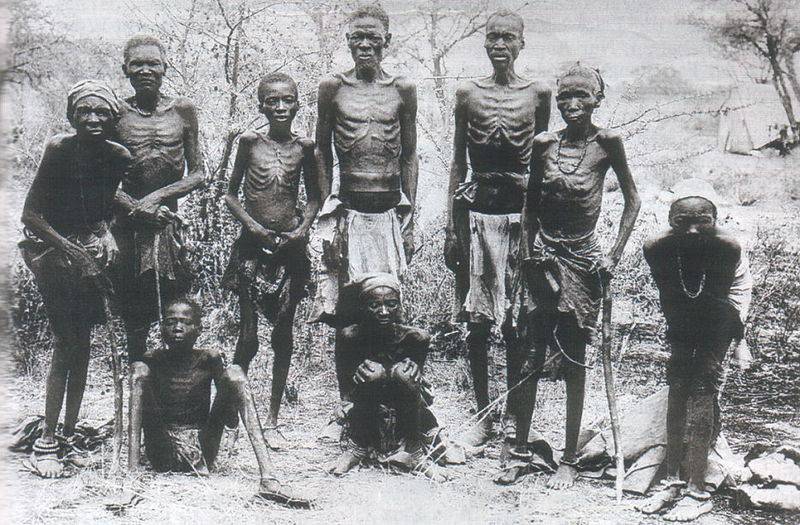
As is known, Germany, together with Italy and Japan, entered into the struggle for the colonial division of the world relatively late. However, already in 1880 - 1890 - s. she managed to acquire a number of colonial possessions in Africa and Oceania. One of the most important acquisitions in Germany was South-West Africa. In 1883, Adolf Luderitz, a German entrepreneur and adventurer, bought land on the coast of modern Namibia from the leaders of local tribes, and in 1884, Germany’s right to own these territories was recognized by the United Kingdom. Southwestern Africa with its desert and semi-desert territories was sparsely populated, and the German authorities, deciding to act along the lines of the Boers in South Africa, began to encourage the migration of German colonists to South-West Africa.
The colonists, taking advantage of the advantages in armament and organization, began to select the lands most suitable for agriculture from the local Herero and Nama tribes. Herero and Nama are the main indigenous peoples of South West Africa. Herero is spoken in the language оiguerero, belonging to the Bantu languages. Currently, Herero live in Namibia, as well as in Botswana, Angola and South Africa. The number of herero is about 240 thousand people. It is possible that if it were not for the German colonization of South-West Africa, there would be much more of them - the German troops destroyed 80% of the Herero people. Nama is one of the groups of Hottentots belonging to the so-called Khoisan peoples - the natives of South Africa, belonging to a particular capoid race. Nama live in the southern and northern part of Namibia, in the territory of the Northern Cape Province in the Republic of South Africa, as well as in Botswana. Currently, the number of Nama reaches 324 thousand people, 246 thousand of them live in Namibia.
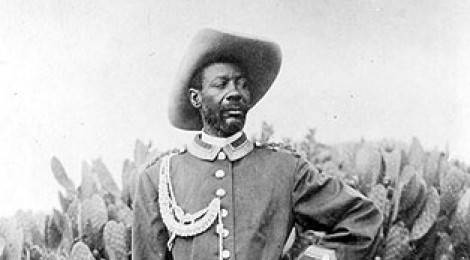
Herero and Nama were engaged in cattle breeding, and German colonists who came to South-West Africa, with the permission of the colonial administration, took the best pasture land from them. Since 1890, the post of Supreme Leader of the People, Herero was held by Samuel Magarero (1856-1923). In the 1890 year, when German expansion in South-West Africa was just beginning, Magarero signed an agreement on “protection and friendship” with the German authorities. But then the leader realized what the colonization of South-West Africa was fraught with for his people. Naturally, the German authorities were out of range for the leader of the Herero, so the anger of the leader was directed at the German colonists - farmers who seized the best pasture land. 12 January 1903 Mr. Samuel Magarero raised the Herero rebellion. The rebels killed a 123 man, including women and children, and laid siege to Windhoek, the administrative center of German South West Africa.
Initially, the actions of the German colonial authorities in countering the rebels were not successful. The governor of the colony, T. Leitwein, commanded the German troops, and very few troops were subordinate to them. German troops suffered heavy losses from the actions of the rebels and the typhus epidemic. In the end, Berlin removed Leitwein from the command of the colonial forces. It was also decided to separate the posts of the governor and the commander-in-chief of the troops, since a good manager is not always a good commander (as, by the way, and vice versa).
To suppress the Herero uprising, the expedition corps of the German army under the command of Lieutenant General Lothar von Trotha was sent to South-West Africa. Adrian Dietrich Lothar von Tróth (1848-1920) was one of the most experienced German generals of that time, his experience on the 1904 year was almost forty years - he joined the Prussian army in the 1865 year. During the Franco-Prussian War for his valor he received the Iron Cross. General von Troth was considered a “specialist” in the colonial wars — in 1894, he participated in suppressing the Maji-Maggi uprising in German East Africa, in 1900 he commanded the 1 of the East Asian Infantry Brigade during the suppression of the Ihetoi uprising in China.
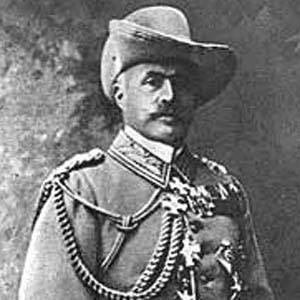 3 in May 1904 von Trot was appointed commander-in-chief of the German troops in South West Africa, and 11 in June 1904 he, at the head of attached military units, arrived at the colony. The Von Troths had at their disposal 8 cavalry battalions, 3 machine-gun companies and 8 artillery batteries. Von Troth did not count much on the colonial troops, although the units staffed by the natives were used as auxiliary forces. In mid-July 1904, the troops of the Trota background began advancing towards the Herero land. Toward the Germans, the overwhelming power of the Africans advanced - about 25-30 thousand people. True, it is necessary to understand that Herero went on a campaign together with their families, that is, the number of soldiers was much smaller. It should be noted that almost all herero warriors by that time already had firearms weaponbut the cavalry and artillery of the rebels were absent.
3 in May 1904 von Trot was appointed commander-in-chief of the German troops in South West Africa, and 11 in June 1904 he, at the head of attached military units, arrived at the colony. The Von Troths had at their disposal 8 cavalry battalions, 3 machine-gun companies and 8 artillery batteries. Von Troth did not count much on the colonial troops, although the units staffed by the natives were used as auxiliary forces. In mid-July 1904, the troops of the Trota background began advancing towards the Herero land. Toward the Germans, the overwhelming power of the Africans advanced - about 25-30 thousand people. True, it is necessary to understand that Herero went on a campaign together with their families, that is, the number of soldiers was much smaller. It should be noted that almost all herero warriors by that time already had firearms weaponbut the cavalry and artillery of the rebels were absent. On the border of the Omaheke desert, opposing forces met. The battle broke out on August 11 on the slopes of the Waterberg mountain range. Despite the superiority of the Germans in arms, the Germans successfully attacked the Herero. The situation reached bayonets, von Troth was forced to abandon all forces to defend artillery shells. As a result, although the Herero clearly outnumbered the Germans in number, the organization, discipline and combat training of the German soldiers did their job. The rebels' attacks were repulsed, after which artillery fire was opened on the herero positions. Chief Samuel Magerero decided to retreat to the desert areas. The losses of the German side in the battle of Waterberg made 26 people killed (including 5 officers) and 60 wounded (including 7 officers). In the same Hererero main losses fell not so much on the battle, but on the painful transition through the desert. German troops pursued the retreating Herero, shooting them with machine guns. The actions of the command even caused a negative assessment by German Chancellor Benhard von Bülow, who was indignant and told the Kaiser that the behavior of the German troops did not comply with the laws of warfare. To this, Kaiser Wilhelm II replied that such actions are consistent with the laws of war in Africa. During the desert crossing, 2 / 3 perished from the total number of herero. Herero rescued in the territory of neighboring Bechuanaland - the British colony. Now it is an independent country of Botswana. A reward of five thousand marks was promised to Magerero's head, but he disappeared into Bechuanaland with the remnants of his tribe and happily lived to old age.
Lieutenant-General von Trotha, in turn, issued the notorious order “on liquidation,” which actually provided for the genocide of the Herero people. It was ordered to all herero to leave German South-West Africa on pain of physical destruction. Any herero caught within the colony was ordered to be shot. All the Herero pastures were taken by German colonists.
However, the concept of total destruction of the Herero, advanced by General von Troth, was actively challenged by the Governor of Leitwein. He believed that it was much more profitable for Germany to turn the Herero into slaves by imprisoning them in concentration camps than simply destroying them. In the end, the Chief of General Staff of the German Army, General Count Alfred von Schlieffen, agreed with the point of view of Leitwein. Those of the Herero who did not leave the colony were sent to concentration camps, where they were actually used as slaves. Many herero died in the construction of the copper mines and the railway. As a result of the actions of the German troops, the Herero people were almost completely annihilated and now the Herero constitute only a small part of the inhabitants of Namibia.
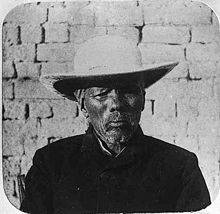
However, after the Herero, in October 1904, in the southern part of the German South-West Africa, the tribes of the Hottentots Nama rebelled. Nama's uprising was led by Hendrik Whitboy (1840-1905). The third son of the leader of the tribe Moses Kido Vitboa, still in 1892-1893. Hendrik fought against the German colonialists, but then, like Samuel Magerero, in 1894 he concluded an agreement on “protection and friendship” with the Germans. But in the end, Whitboy also made sure that German colonization was no good for the Hottentots. It should be noted that Vitboi managed to develop a rather effective tactic of counteracting the German troops. The Hottentot rebels used the classic “hit and flee” guerrilla warfare method, avoiding direct clashes with German military units. Thanks to this tactic, which was more profitable for the African rebels than the actions of Samuel Magerero, who made a head-on collision with the German troops, the Hottentot uprising lasted almost three years. In 1905, Hendrik Whitboy himself died. After his death, the leadership of the Nama detachments was carried out by Jacob Morenga (1875-1907). He came from a mixed family of nama and herero, worked in a copper mine, and in 1903 created a rebel squad. Partisans Morenga successfully attacked the Germans, and even forced the German unit to retreat in battle at Hartebestmünde. In the end, British troops from the neighboring Cape Province came out against the Hottentots, in which the guerrilla unit was destroyed in a battle with 20 September 1907, and Jacob Moreng himself was killed. Currently, Hendrik Vitboi and Jacob Morenga (pictured) are considered national heroes of Namibia.
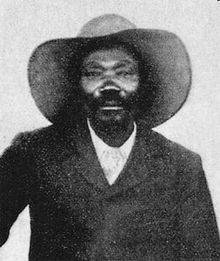 Like Herero, the people of Nama suffered greatly from the actions of the German authorities. According to the researchers, a third of the Nama people died. Historians estimate the loss of nama during the war with the German troops not less than in 40 thousands of people. Many of the Hottentots were also imprisoned in concentration camps and used as slaves. It should be noted that it was South-West Africa that became the first testing ground at which the German authorities tried methods of genocide against undesirable peoples. For the first time, concentration camps were set up in South West Africa, in which all men, women, and children of Herero were imprisoned.
Like Herero, the people of Nama suffered greatly from the actions of the German authorities. According to the researchers, a third of the Nama people died. Historians estimate the loss of nama during the war with the German troops not less than in 40 thousands of people. Many of the Hottentots were also imprisoned in concentration camps and used as slaves. It should be noted that it was South-West Africa that became the first testing ground at which the German authorities tried methods of genocide against undesirable peoples. For the first time, concentration camps were set up in South West Africa, in which all men, women, and children of Herero were imprisoned. During the First World War, the territory of the German South-West Africa was occupied by the troops of the Union of South Africa - British dominion. Now German settlers and soldiers were in camps near Pretoria and Pietermaritzburg, although the South African authorities treated them very gently, without even taking away weapons from prisoners of war. In 1920, South-West Africa was transferred to the South African Union as a mandated territory. The South African authorities were no less brutal against the local population than the Germans. In 1946, the UN refused to satisfy the South African Africa’s request for the inclusion of South West Africa into the union, after which South Africa refused to transfer this territory to the UN. In 1966, an armed struggle for independence began in South West Africa, in which the leading role was played by SWAPO, the People’s Organization of South West Africa, which enjoyed the support of the Soviet Union and a number of other socialist states. In the end, 21 March 1990 was proclaimed independence of Namibia from South Africa.
It was after independence that the issue of recognition of Germany’s actions in South West Africa in the 1904-1908 began to be actively worked out. genocide of the Herero and Nama peoples. Back in 1985, a UN report was published, stating that as a result of the actions of the German troops, the Herero people lost three-quarters of their numbers, decreasing from 80 thousand to 15 thousand people. After the proclamation of independence of Namibia, the leader of the Herero tribe Riruaco Quaim (1935-2014) appealed to the International Court of Justice in The Hague. The leader accused Germany of the Herero genocide and demanded that the Hero be paid compensation for the people following the example of payment to the Jews. Although Ruauaco Quaima died in 2014, his actions were not in vain - eventually, two years after the death of the leader Herero, known for his uncompromising position on the genocide issue, Germany still agreed to recognize the Herero genocide, but yet without compensation.
Information